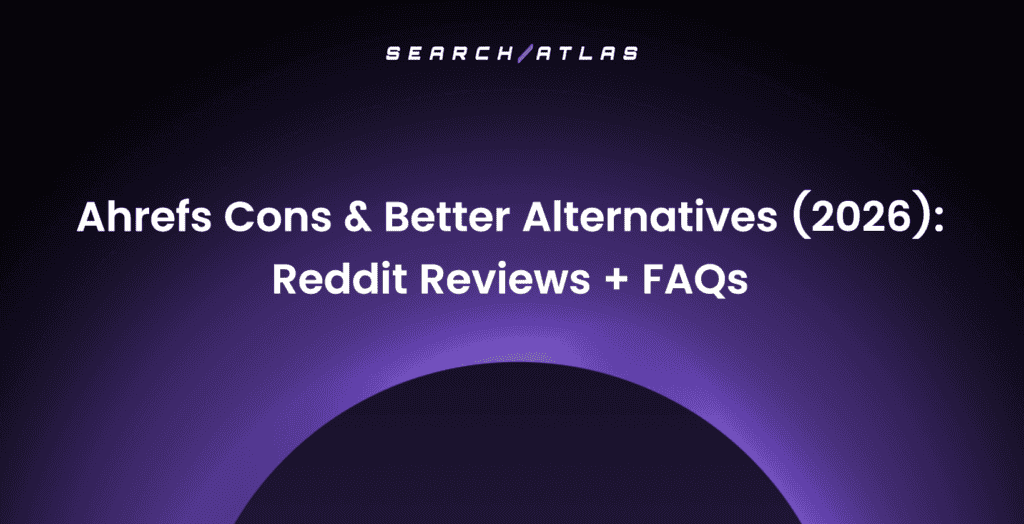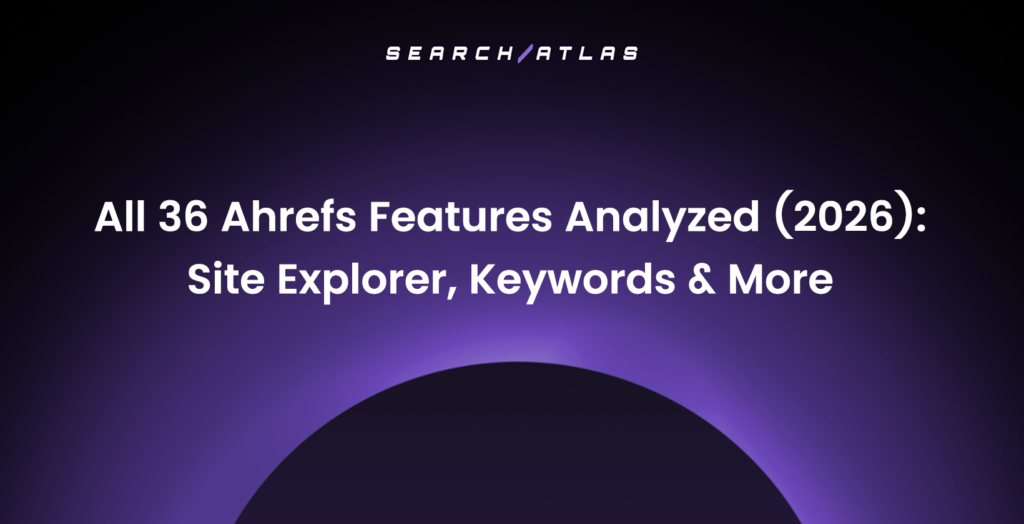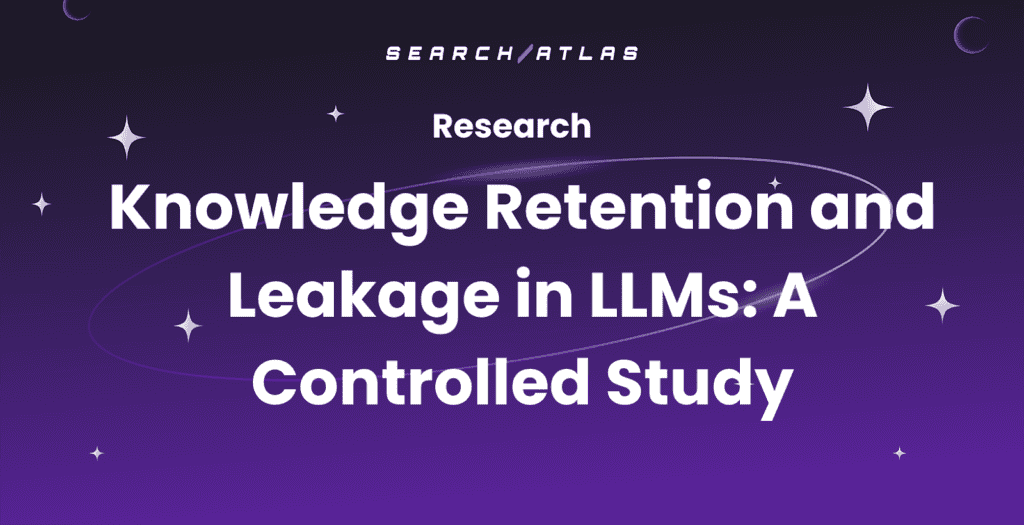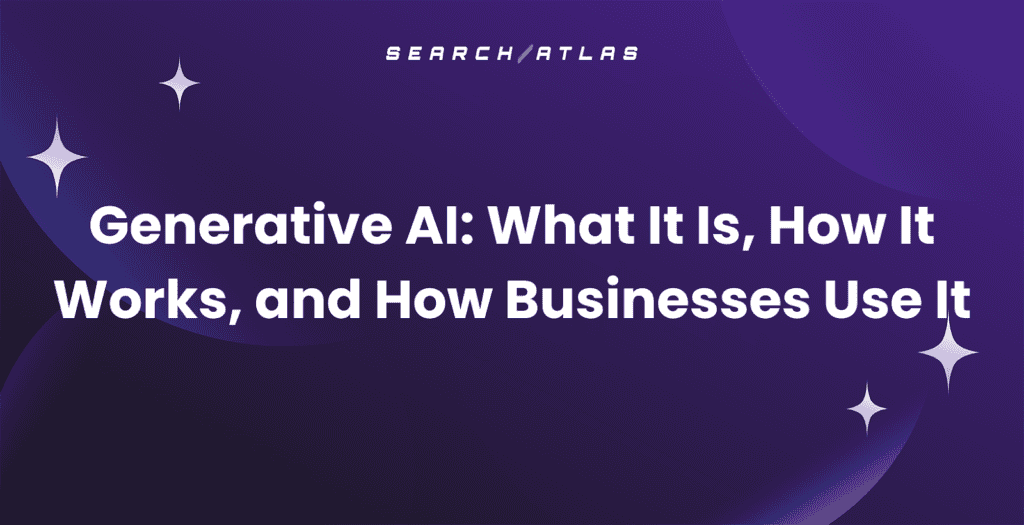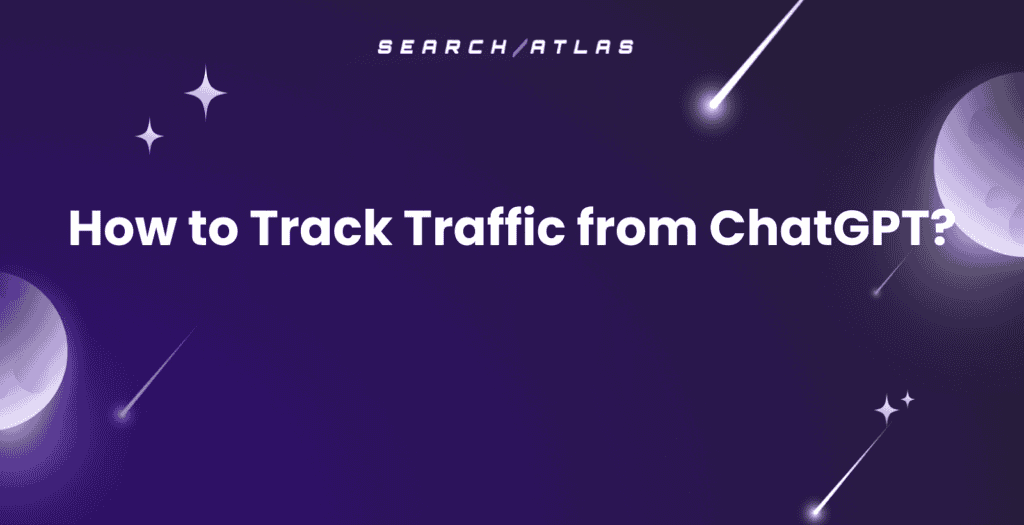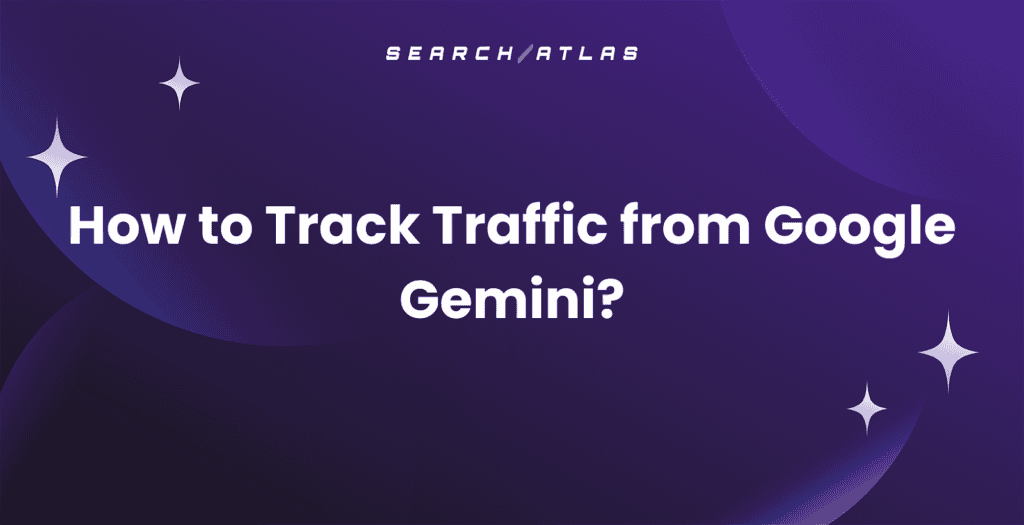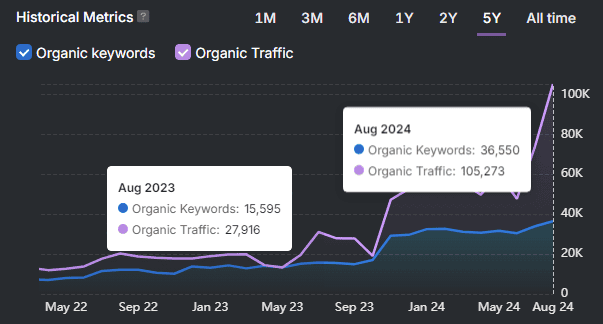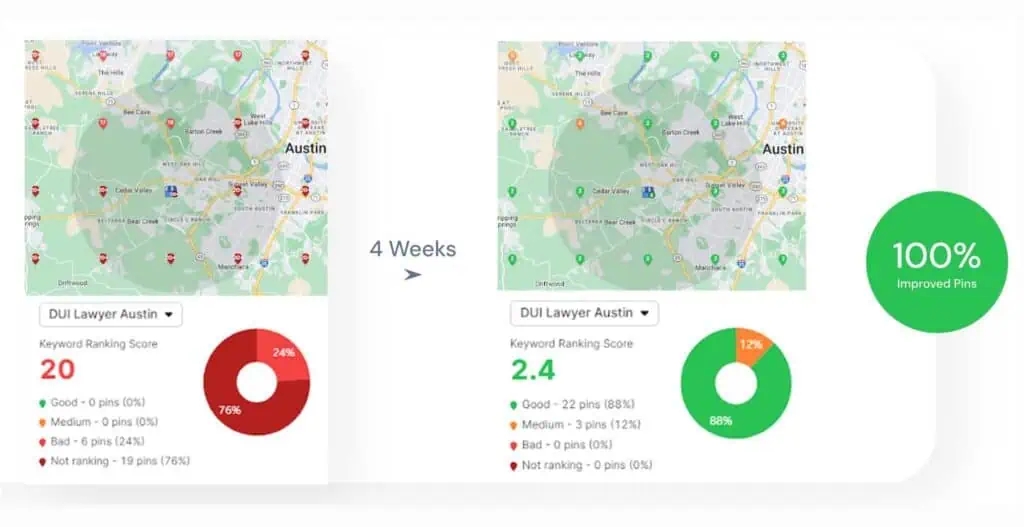Raven Tools alternatives are SEO platforms that replace Raven Tools in core functions such as rank tracking, backlink analysis, site audits, and client reporting. The Raven Tools review highlights how the tool helps SEO professionals monitor keyword performance, manage link data, and compile multi-channel metrics into unified reports.
Users typically rely on the competitors of Raven Tools when they need deeper data access, more frequent keyword insights, advanced content workflows, or broader platform integrations than Raven Tools provides.
Search Atlas, AgencyAnalytics, and SE Ranking are the best Raven Tools alternatives in 2025. These platforms support daily tracking, automated white-label reporting, backlink indexing, and scalable SEO operations.
The 11 best Raven Tools alternatives for every agency size, budget, and technical requirement are listed below.
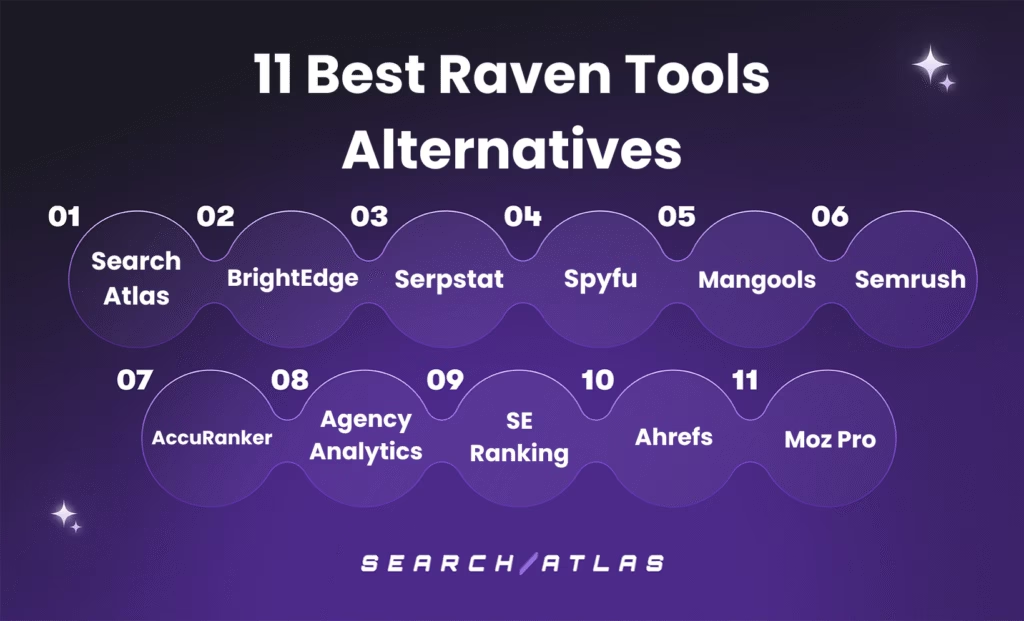
Best All-in-One SEO Alternatives to Raven Tools
1. Search Atlas
Search Atlas SEO is an all-in-one SEO platform that connects keyword research, content creation, technical fixes, and local visibility into a single automated system. Search Atlas is an alternative to Raven Tools because it offers broader functionality, deeper keyword datasets, real-time ranking data, and fully integrated local SEO workflows.
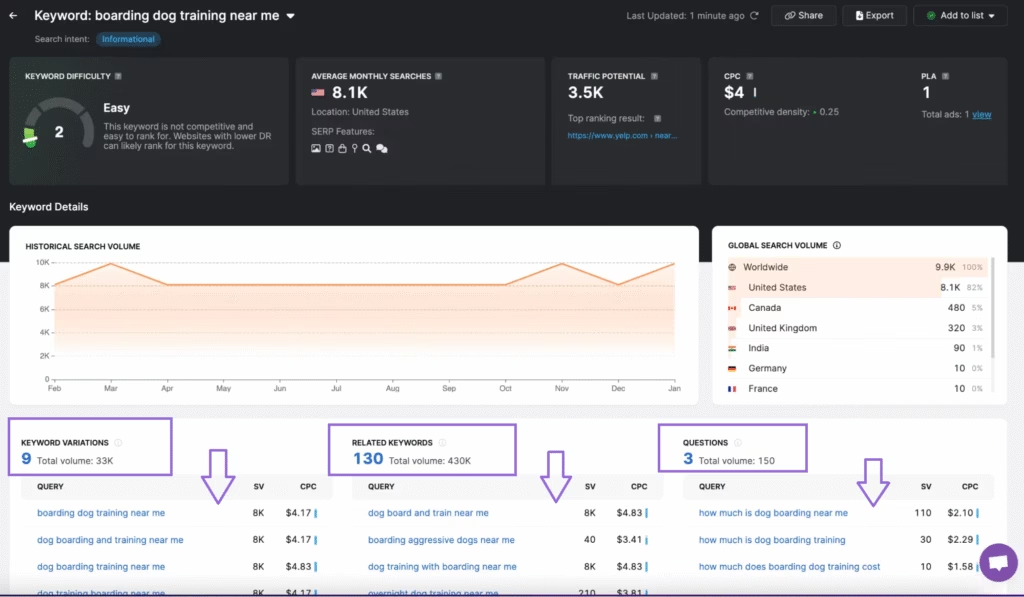
Search Atlas includes advanced keyword tools powered by a 5.2 billion term database, which offers full visibility into volume, difficulty, CPC, and intent. Keyword rankings pull verified data directly from Google Search Console (GSC), which avoids delays or sampling limits found in Raven Tools.
Search Atlas replaces the limited domain analysis in Raven Tools with Domain Power (DP), a metric that reflects organic authority using real GSC rankings and traffic. Site Explorer shows which domains dominate SERP features like local packs, snippets, and sitelinks.
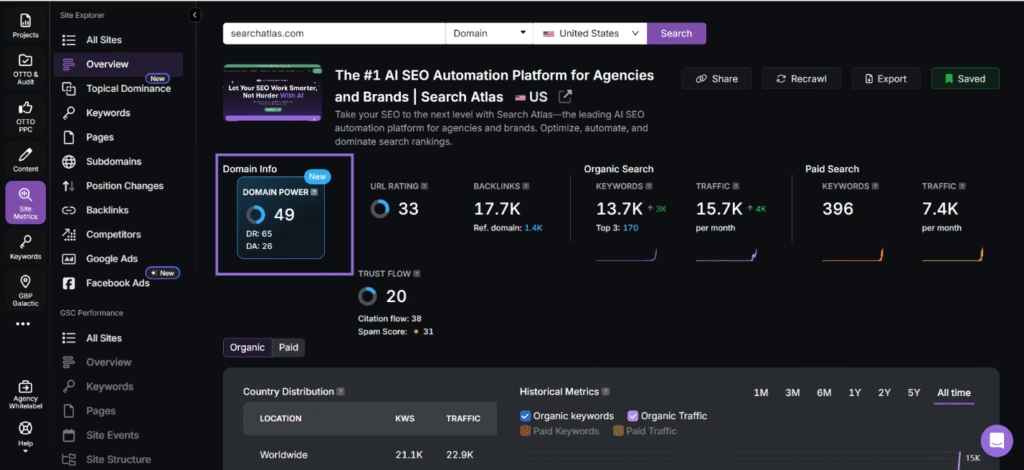
For local SEO, Search Atlas automates search grid reports with heatmaps that show keyword visibility by city, ZIP code, or neighborhood. Real-time local tracking, visual performance grids, and SERP Competitor Insights help users localize strategies that Raven Tools lacks.
Site audits and technical tasks run through OTTO SEO, the built-in AI assistant. OTTO finds and fixes SEO issues, manages schema, and updates internal links automatically. All audits reflect live data and actionable fixes across content, indexation, and performance.
Search Atlas replaces disconnected workflows with unified tracking and reporting. Reports combine live rank updates and content engagement into one interface. AI summaries highlight results, while white-label options let agencies scale delivery.
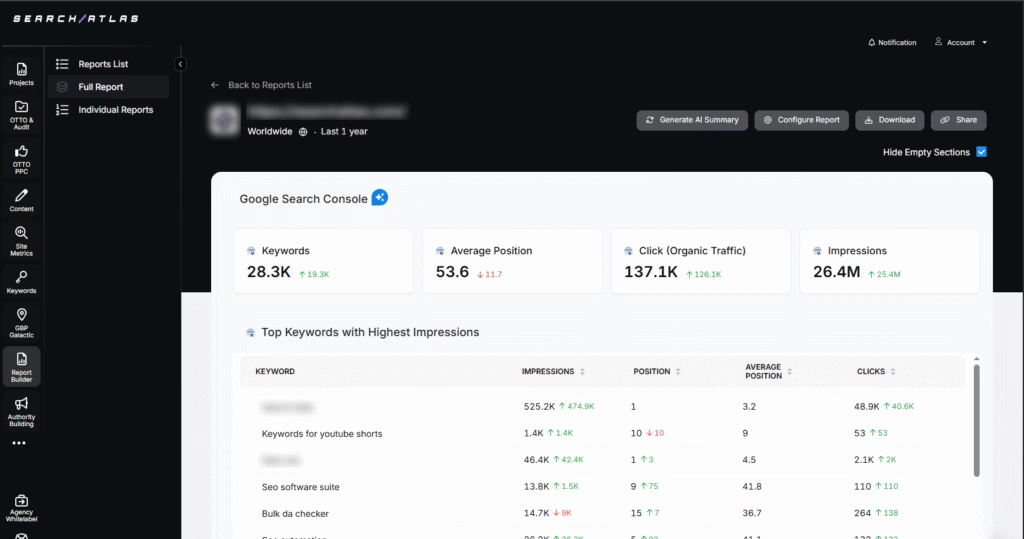
Search Atlas pricing starts at $99 per month with all features unlocked. Enterprise tiers add white-label hosting, API access, and team controls. A 7-day free trial is available for all plans.
Pros featured in the Search Atlas review include real-time Google-sourced data, complete automation via OTTO SEO, and unlimited feature access. Cons of Search Atlas include an initial learning period for workflow automation features.
Search Atlas is the best Raven Tools alternative for users who need complete SEO coverage, real-time local tracking, and automated technical workflows.
2. BrightEdge
BrightEdge is an enterprise SEO platform that connects SEO strategy to business outcomes through real-time data pipelines and automated reporting workflows. BrightEdge is an alternative to Raven Tools because it combines AI-powered insights, technical SEO capabilities, rank tracking, and performance-driven content tools in a single solution.
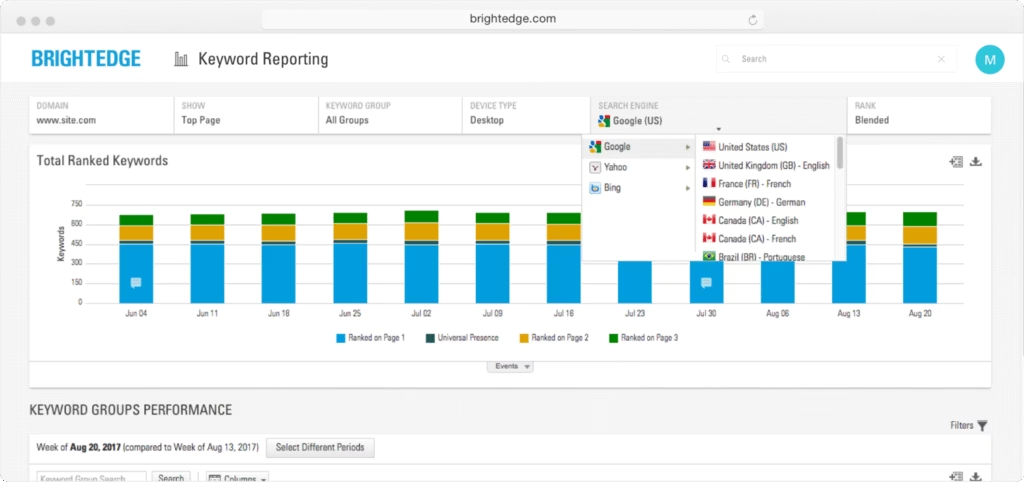
As an alternative to Raven Tools, BrightEdge excels in large-scale automation, competitive research depth, and integrated content performance tracking. BrightEdge provides stronger automation and data infrastructure for enterprise teams.
Top features in BrightEdge include real-time keyword discovery with Data Cube X, AI-assisted content tools, and Share of Voice tracking across Google, Amazon, and YouTube. BrightEdge supports technical audits, mobile SEO evaluation, and performance benchmarking tied to business KPIs.
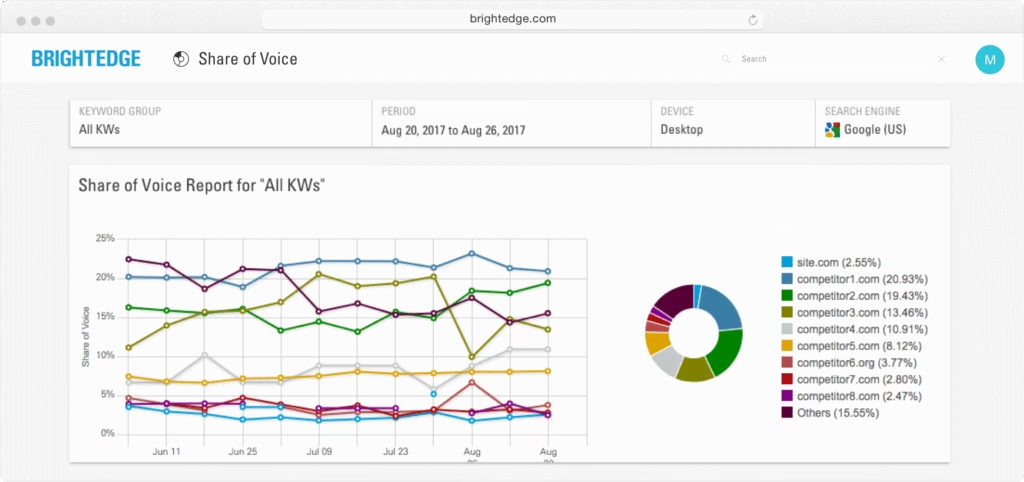
BrightEdge is a paid platform that uses custom pricing based on business size and usage level. BrightEdg Plans are tailored for enterprise teams with global SEO requirements and complex reporting needs.
Automation at scale, intent-matched content tracking, and enterprise data clarity are major pros in the BrightEdge review. BrightEdge cons include limited accessibility for smaller teams and a pricing model designed for large organizations.
BrightEdge is a Raven Tools alternative often preferred by large organizations managing complex SEO operations, multiple domains, and aggressive growth goals.
3. Serpstat
Serpstat is an all-in-one SEO platform built for teams that manage SEO, PPC, and competitive analysis. Serpstat is an alternative to Raven Tools because it combines keyword research, rank tracking, backlink analysis, site audits, and content tools into one system that supports over 230 regions and multiple languages.
Compared to Raven Tools, Serpstat delivers sharper keyword research, deeper audits, a native backlink index, and more automated reporting with support for multilingual SERPs and bulk domain evaluations.
Serpstat features include rank tracking by device and region, backlink comparisons by domain, and a scoring system that prioritizes technical issues during audits. Its automation features allow teams to group keywords, flag anomalies, and monitor SERP volatility without manual setup.
White-label reporting in Serpstat mirrors Raven Tools, but with more flexibility. The Serpstat White-label SEO tool allows users to remove branding, add custom logos, assign user roles, and automate the delivery of reports and project updates.
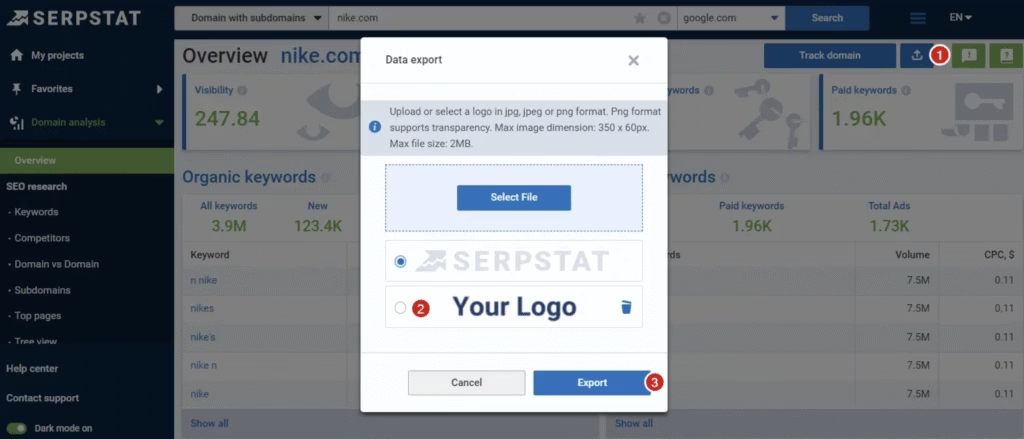
Serpstat pricing starts at $50 per month and includes daily checks, audit tools, keyword clustering, and link data. Higher tiers add API access, AI-driven modules, and expanded usage caps.
Pros in the Serpstat review include scalable keyword clustering, strong automation depth, multi-language support, and flexible white-label reporting. Cons of Serpstat are limited backlink index coverage for enterprise needs and keyword volumes based on Google Ads estimates.
Best Competitor and Keyword Intelligence Alternatives to Raven Tools
4. SpyFu
SpyFu is a competitive research platform built to uncover keyword strategies, ad performance, and content gaps across both organic and paid search. With over 19 years of Google Ads history, the SpyFu platform reveals how competitors rank, bid, and adapt their SEO strategies over time.
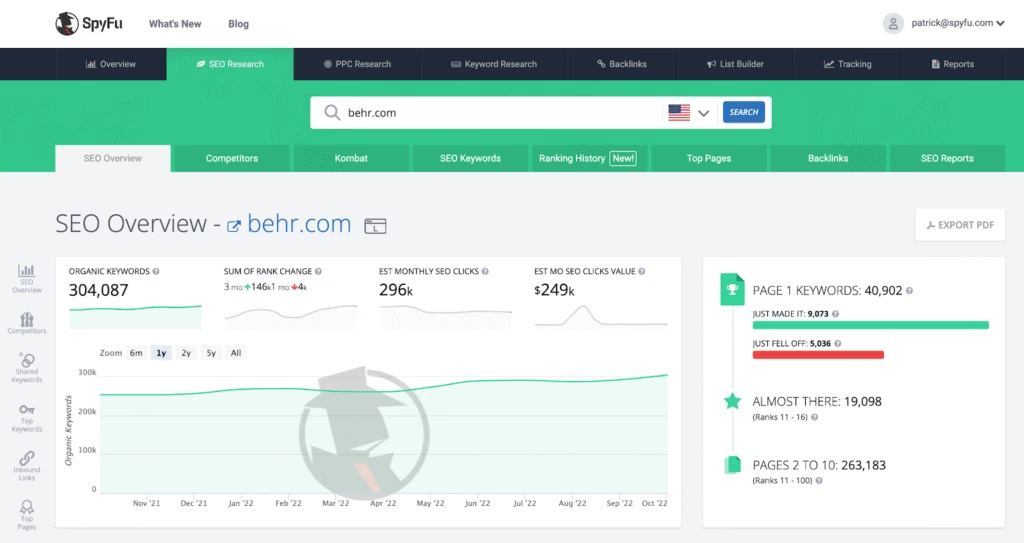
Compared to Raven Tools, SpyFu provides deeper advertising intelligence and long-term historical insights. SpyFu offers deeper PPC visibility, historical ad trend tracking, and domain-based keyword strategies.
SpyFu is an alternative to Raven Tools because it offers tools for keyword research, rank tracking, PPC monitoring, and content gap analysis. The popular features of Spyfu include Kombat View for keyword overlap, historical SERP snapshots, PPC ad copy tracking, and domain-level keyword downloads. SpyFu RivalFlow AI evaluates your content against competitors and suggests targeted revisions to close ranking gaps.
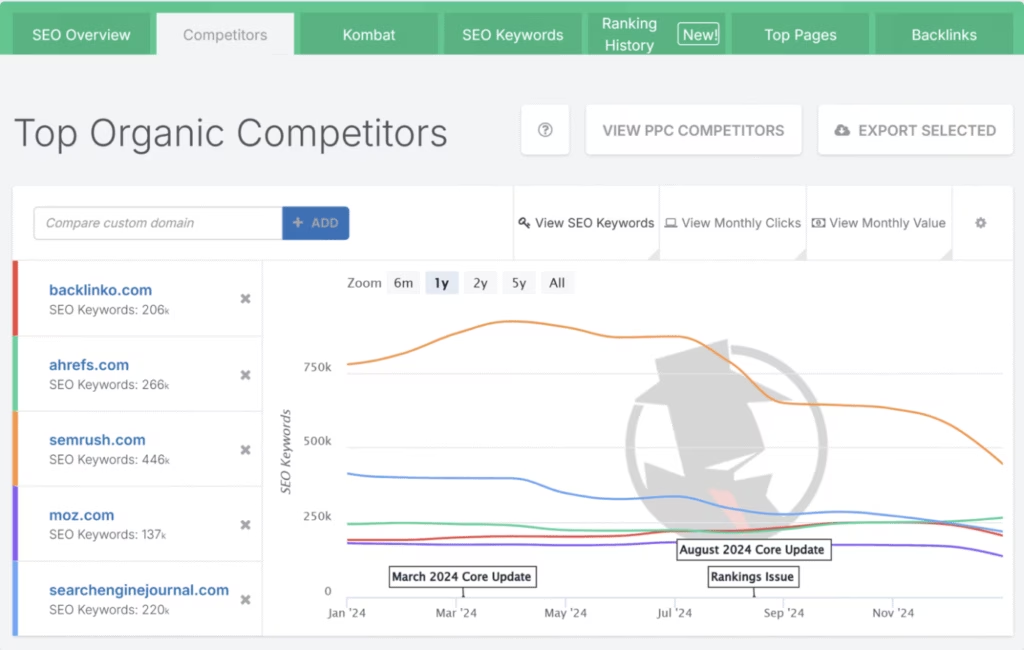
SpyFu plans start at $9 per month with unlimited keyword lookups and exports. Higher tiers support team collaboration and domain-wide tracking. SpyFu is significantly cheaper than Raven Tools, especially for users focused on competitive research and PPC visibility.
Pros in the SpyFu review include detailed PPC history, unlimited keyword searches, built-in AI content tools, and strong competitor profiling. Cons of SpyFu are limited backlink metrics, basic audit capabilities, and weaker support for technical SEO workflows.
For teams focused on paid and organic competitor targeting, SpyFu is a Raven Tools competitor that provides more robust search advertising data and content gap recommendations.
5. Mangools
Mangools is a lightweight SEO platform tailored for freelancers, bloggers, and small businesses focused on keyword research and competitor tracking. Mangools is an alternative to Raven Tools because it includes tools for localized keyword analysis, daily rank tracking on desktop and mobile, and visual SERP previews to assess real-time changes.
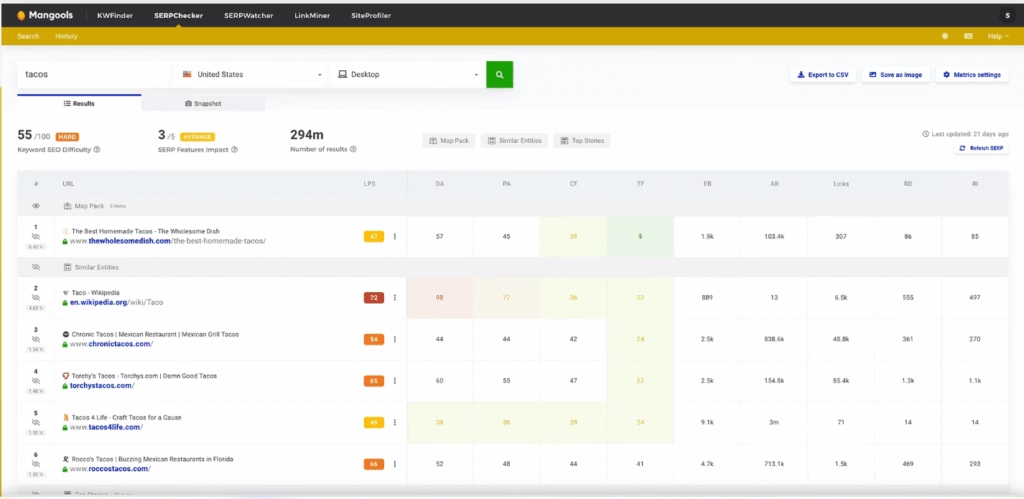
As an alternative to Raven Tools, Mangools offers deeper keyword research and clearer SERP insights. The Mangools keyword module includes difficulty scores, intent segmentation, and historical SERP snapshots that help evaluate ranking potential with precision.
Top features in Mangools include KWFinder for uncovering low-competition keywords with global and local volume data. SERPWatcher tracks daily rankings with device-level filters and movement alerts. LinkMiner provides backlink analysis using Majestic metrics. SiteProfiler reveals domain authority, page-level performance, and top-linked content.
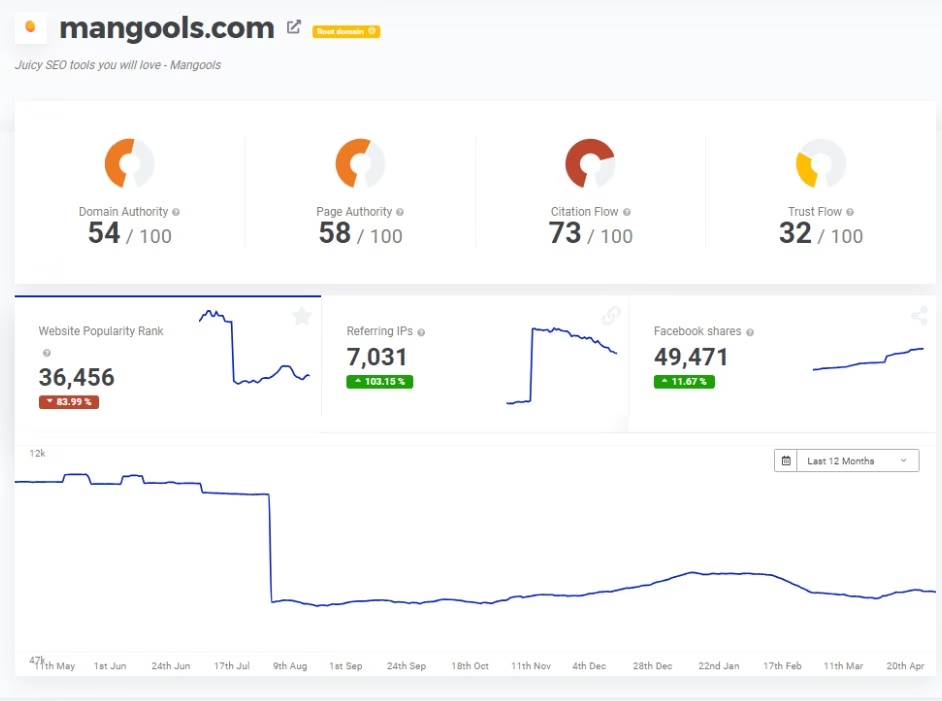
Mangools is a paid tool with plans ranging from $24.50 to $64.50 per month based on lookup limits, tracked keywords, and team seats. All plans include access to every feature, with a 10-day free trial available.
Pros of Mangools include clean, intuitive navigation, fast research workflows, and transparent pricing. Mangools review highlights key cons such as the lack of technical site audit tools, limited scalability, and no white-label options for agency reporting.
6. Semrush
Semrush is an all-in-one digital marketing suite built to improve visibility across SEO, PPC, and social channels. Semrush is an alternative to Raven Tools because it supports keyword research, backlink tracking, site audits, content optimization, and competitive analysis in over 140 regions.
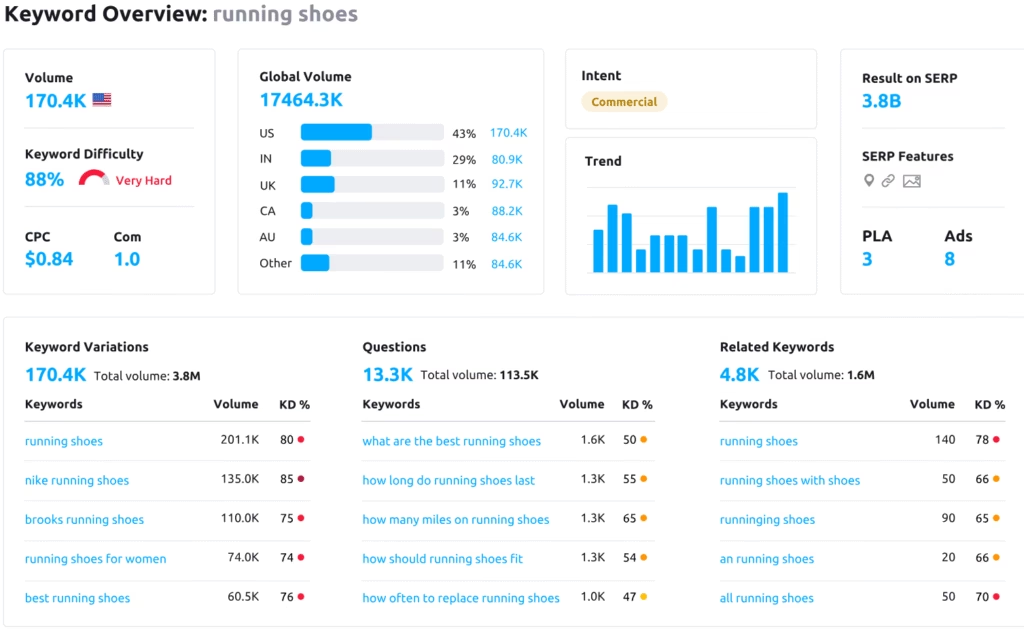
Compared to Raven Tools, Semrush offers depth in domain intelligence and keyword strategy. Raven Tools focuses on reporting but limits domain insights and provides basic keyword suggestions without difficulty scores. Semrush expands these areas with broader data and actionable insights.
Semrush features include rank tracking with daily updates, SERP volatility monitoring through Sensor, and advanced PPC tools for analyzing competitor performance. The keyword database in Semrush holds 26.6 billion keywords with results segmented by intent, difficulty, and SERP overlap to support precise targeting.
The Semrush Domain Overview module reveals organic traffic trends, backlink strength, authority metrics, and top-performing keywords for any domain. This visibility helps teams build stronger strategies than those possible with Raven Tools.
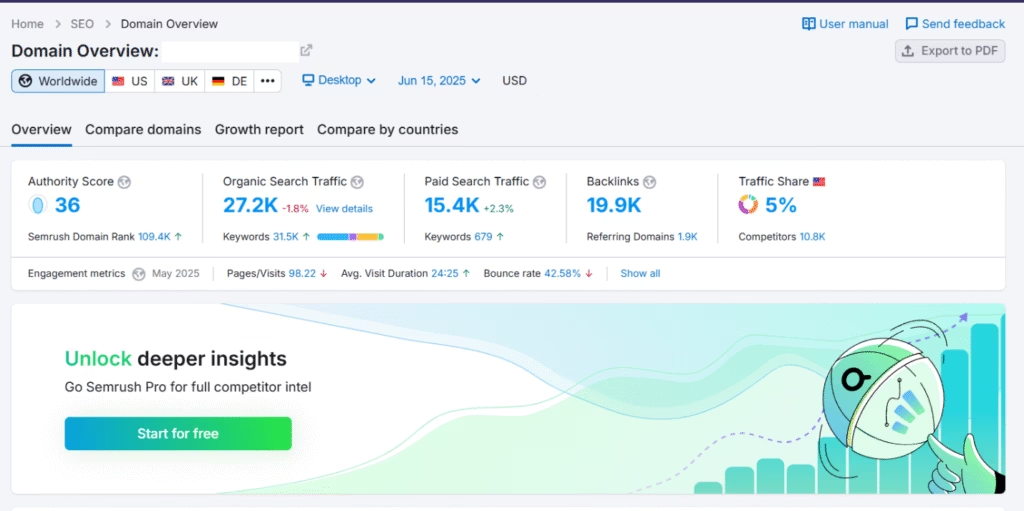
Semrush pricing starts at $139.95 per month. Higher tiers increase keyword and project limits and unlock features like API access, advanced reporting, and competitive traffic analysis. Add-ons are required for local SEO and expanded integrations.
Key pros of Semrush include unmatched keyword depth, integrated SEO-PPC workflows, and enterprise-grade reporting. As highlighted in the Semrush review, the main cons involve steep pricing and a learning curve that does not suit smaller teams or beginners.
Best Precise Rank Tracking Alternatives to Raven Tools
7. AccuRanker
AccuRanker is a dedicated rank-tracking platform built for precision, speed, and large-scale keyword monitoring. AccuRanker is an alternative to Raven Tools because it manages daily updates, localized SERP analysis, and AI-estimated CTR models with full control over filters, tags, and segment views.
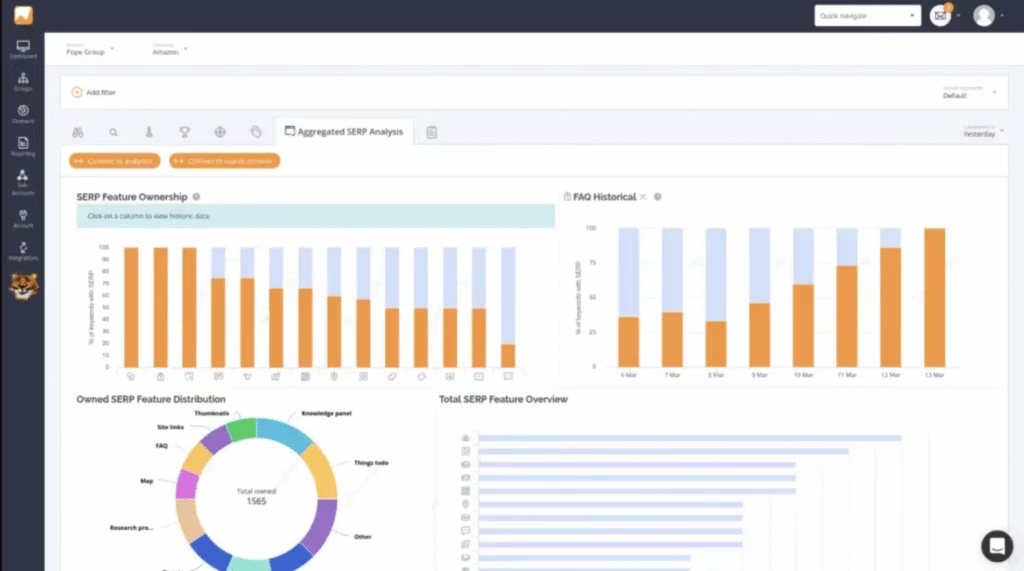
Compared to Raven Tools, AccuRanker provides more detailed control, faster updates, and better local accuracy. AccuRanker supports real-time keyword refresh, dynamic grouping, and custom visibility metrics that Raven Tools lacks, especially for high-volume keyword sets or granular regional tracking.
AccuRanker connects with Looker Studio, GSC, and Adobe Analytics for extended data visibility. Key AccuRanker features include Share of Voice tracking, pixel-level SERP layout analysis, keyword segmentation, AI-based CTR forecasting, and competitor benchmarking by tag or region.
AccuRanker is a paid platform. Plans start at $129 per month for 1,000 keywords. All plans include full feature access, unlimited domains, and API integration.
AccuRanker pros mentioned in the AccuRanker review include fast update cycles, accurate ZIP-level tracking, and visibility metrics based on real SERP layouts. Cons of AccuRanker include the lack of backlink, audit, or content tools, and limited appeal for teams seeking a full-suite platform.
8. AgencyAnalytics
AgencyAnalytics is a reporting-focused SEO and marketing platform designed for agencies managing cross-channel campaigns. AgencyAnalytics is an alternative to Raven Tools because it combines keyword tracking, white-label dashboards, and integrations across 75+ data sources to centralize client reporting.
AgencyAnalytics places a stronger emphasis on visual dashboards and multi-channel data consolidation than Raven Tools. AgencyAnalytics delivers flexible rank updates, live SERP insights, and white-label reports built to showcase performance across SEO, PPC, and social platforms.
Core features in AgencyAnalytics include a daily-updated rank tracker, location-based keyword tracking, share of voice insights, and client-access controls. AgencyAnalytics offers a White-Label feature with customizable dashboards, report scheduling, and client login portals.
These tools let teams highlight wins, display rankings, and automate performance updates without external branding or manual assembly.
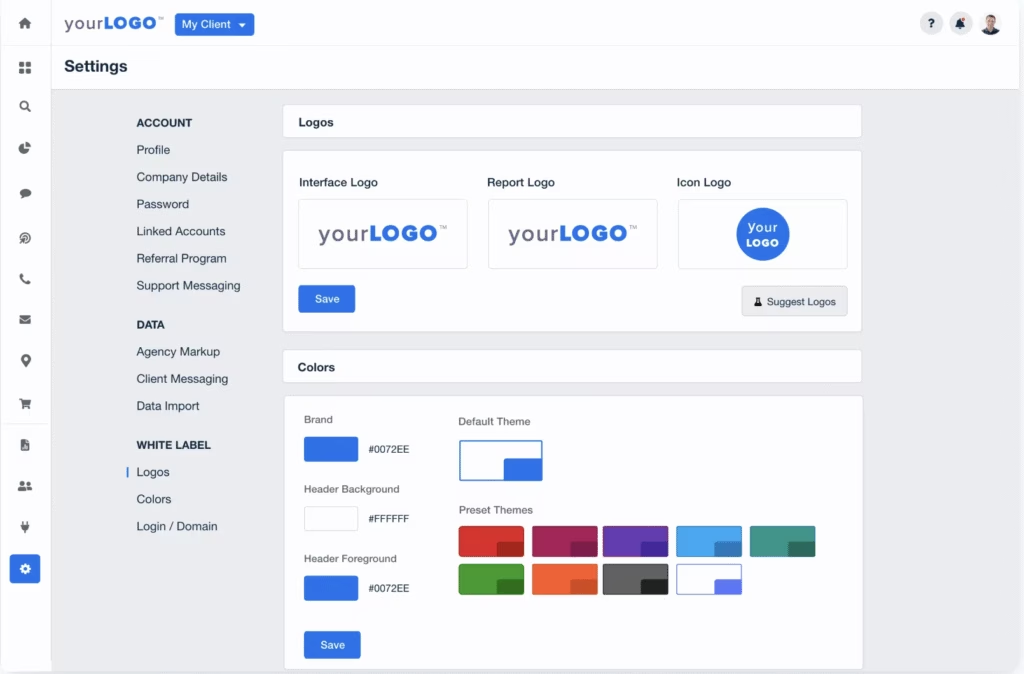
AgencyAnalytics is a paid tool with three plans. Freelancer starts at $59 per month, Agency at $179 per month, and Agency Pro at $349 per month. AgencyAnalytics includes a free trial with limited features.
Pros highlighted in AgencyAnalytics reviews include simple setup, time-saving integrations, and polished white-label outputs that streamline agency-client reporting. Common cons include limited chart customization and expiration of older reports, which affects long-term performance review.
9. SE Ranking
SE Ranking is a cloud-based SEO platform built for agencies and teams managing full-scope campaigns across keyword tracking, content optimization, and technical evaluation. SE Ranking is an alternative to Raven Tools because it combines local SEO automation, on-page auditing, and branded report delivery.
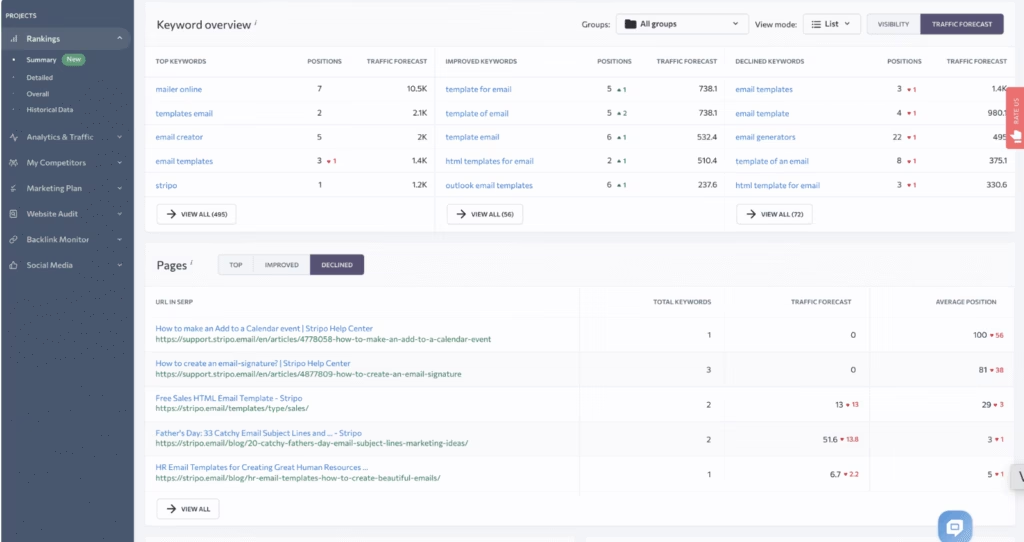
Compared to Raven Tools, SE Ranking delivers more precise daily updates and stronger local filtering. SE Ranking tracks rankings by country, region, city, or ZIP without charging for update frequency.
Core features in SE Ranking include daily rank tracking, keyword grouping, content length and structure analysis, AI content assistants, technical health checks, and a multi-country keyword database covering 190 locations.
SE Ranking review mentions that the tool supports SEO and PPC research by tracking up to 20 competitors per project. SE Ranking identifies top-performing keywords, traffic potential, and high-ranking pages across organic and paid search to compare against competitors.
SE Ranking starts at $65 per month for 500 tracked keywords and scales to $259 per month for 5,000 keywords and unlimited projects.
Pros in SE Ranking include reliable daily updates, intuitive dashboards, affordable plans, and fully branded reporting. SE Ranking cons include a smaller backlink database and a lack of advanced spam detection metrics found in top-tier link analysis platforms.
Best Backlink Analysis Alternatives to Raven Tools
10. Ahrefs
Ahrefs is a cloud-based SEO platform built for teams and professionals focused on backlink research, domain analysis, and organic traffic growth. Ahrefs is an alternative to Raven Tools because it centers on SEO performance monitoring, which allows teams to focus on link profiles, content gaps, and competitor visibility.
While Raven Tools includes basic backlink reporting, Ahrefs offers a larger live link index and deeper historical backlink data. Core features in Ahrefs include a backlink index of over 35 trillion links, link profile comparison between domains, and domain-level health scores.
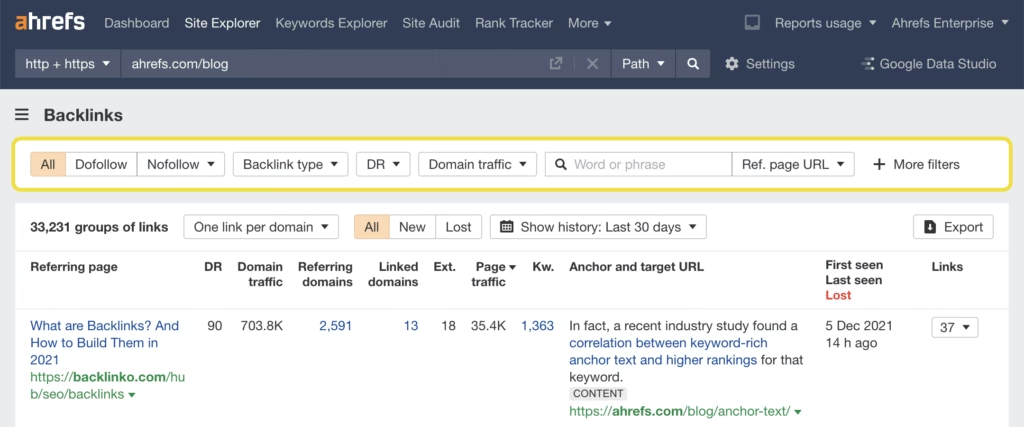
The Ahrefs Site Explorer tool reveals referring domains, anchor text trends, link velocity, and lost or broken links across any entered domain. Ahrefs includes a rank tracker that supports country, device, and time-based position monitoring. Ahrefs allows users to chart ranking trends, track share of voice, and compare visibility against ten competitors per project.
Ahrefs starts at $129 per month. Higher tiers extend data history and increase keyword and report access. Ahrefs does not offer a free plan, and its usage caps often require upgrades as project scope expands.
Pros highlighted in Ahrefs reviews include extensive backlink discovery, domain-level metrics, and strong visibility reporting for high-authority sites. Cons of Ahrefs include a lack of outreach tools, no local SEO features, and a credit-based pricing system that restricts growing teams.
11. Moz Pro
Moz Pro is an entry-level SEO platform designed for marketers who prefer structured workflows and branded authority metrics. Moz Pro is an alternative to Raven Tools because it supports keyword research, backlink evaluation, rank tracking, and technical site audits.
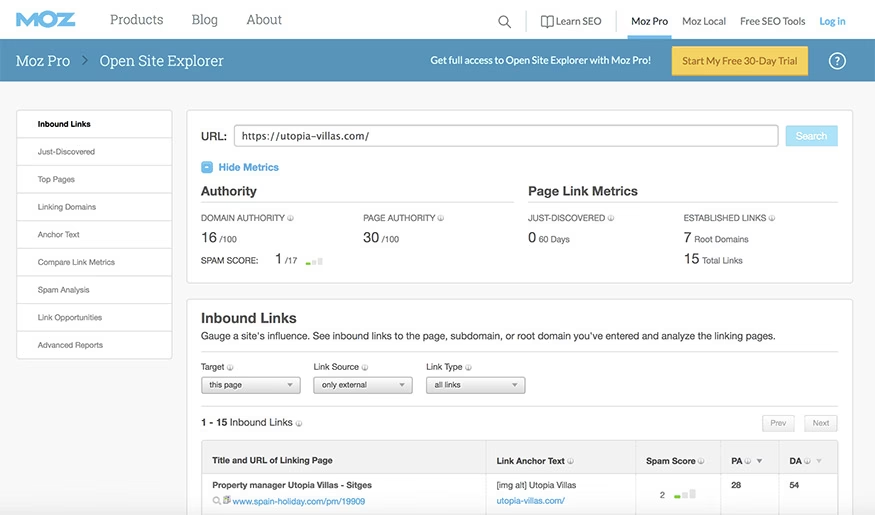
Compared to Raven Tools, Moz Pro delivers stronger link analysis and more refined keyword visibility scoring. Raven Tools offers broader cross-channel integrations but lacks depth in domain-level SEO metrics.
Moz features include Link Explorer, which allows users to audit backlink profiles using total links, referring domains, and anchor text metrics. The tool relies on Moz proprietary authority indicators, which offer a simplified view of link quality.
As mentioned in Moz review, the tool offers a Domain Overview that adds top-ranking pages, inbound link counts, and ranking keywords. These summaries are often too shallow for competitive audits, especially for newer or low-volume domains.
The Moz lower-tier plans start at $49, matching Raven Tools in base pricing. Each plan limits keyword tracking and crawl depth unless upgraded.
Moz Pro pros include simplified SEO metrics and hands-on learning support. Cons of Moz Pro include slower refresh cycles, limited AI tools, and reduced granularity in domain intelligence.
Neither Moz Pro nor Raven Tools includes dedicated tools for content creation or real-time keyword scoring, which limits both platforms for AI-assisted content workflows.
Why do people seek alternatives to Raven Tools?
People look for Raven Tools alternatives because the platform lacks advanced metrics, does not provide key SEO features, and relies heavily on third-party integrations to fill core gaps.
Raven Tools supports keyword tracking, backlink monitoring, and reporting automation, but misses essential capabilities for modern SEO teams. The keyword research module provides limited suggestions and no difficulty scores, which restricts the SERP strategy.
The platform shows surface-level data across many sections, limiting deeper analysis of competitors, content gaps, and technical issues. Raven Tools does not support content optimization, internal linking, or AI-assisted workflows.
The cost of Raven Tools rises with each additional feature or user seat. Agencies that outgrow these limitations often seek the best low-cost alternatives to Raven Tools that include full audits, AI tools, and scalable workflows.
What to Look for in a Raven Tools Alternative?
The 6 features to look for in a Raven Tools alternative are below.
- Automated, Scalable Workflows. Raven Tools centers on report generation but misses automation across SEO actions. Alternatives must support multi-site management, AI execution, and role-based collaboration without tool fragmentation.
- Keyword Research with Difficulty Scores. Raven Tools provides limited keyword suggestions without difficulty ratings. Strong alternatives include CPC, SERP overlap, and intent grouping for sharper targeting and SERP strategy.
- Full Visibility into Domain Power. Raven Tools tracks backlinks but lacks trust flow indicators, domain authority scoring, and anchor-level insights. Better tools offer historical link graphs, toxic risk flags, and authority benchmarking.
- Deeper Site Audits. Raven Tools relies on external integrations to audit sites. Alternatives need to detect indexation errors, structured data gaps, and Core Web Vitals directly inside the platform.
- Content Optimization Built In. Raven Tools does not include tools for optimizing content. Effective replacements analyze headings, entity coverage, and keyword placement with live scoring against top competitors.
- Internal Linking and On-Page AI Fixes. Raven Tools skips internal link structure and on-page automation. Look for platforms with AI-assisted updates to meta tags, schema, and link flow.
Which Raven Tools Alternative offers the best balance of Features and Price?
Search Atlas is the best alternative to Raven Tools in 2025 for teams that need more than reporting. Search Atlas combines rank tracking, technical audits, keyword research, content workflows, and backlink analysis in one connected platform.
The platform offers daily rank tracking that includes segmentation by device, location, and SERP feature. Search Atlas applies live data through OTTO SEO, the built-in assistant that automates content updates, internal linking, and on-page SEO fixes directly from your GSC performance.
Search Atlas DP metric replaces surface-level domain scores by using verified Google data to assess authority. DP highlights the domains with real search influence, which helps teams prioritize backlink targets that impact visibility.
Unlike Raven Tools, Search Atlas delivers deeper keyword intelligence with advanced filters for difficulty, CPC, and search intent, which gives SEO teams stronger insights to prioritize opportunities and outperform competitors.
Teams choose Search Atlas to move beyond isolated reporting tools and adopt a unified system built for visibility and scale. See the difference for yourself, start your 7-day free trial today!





